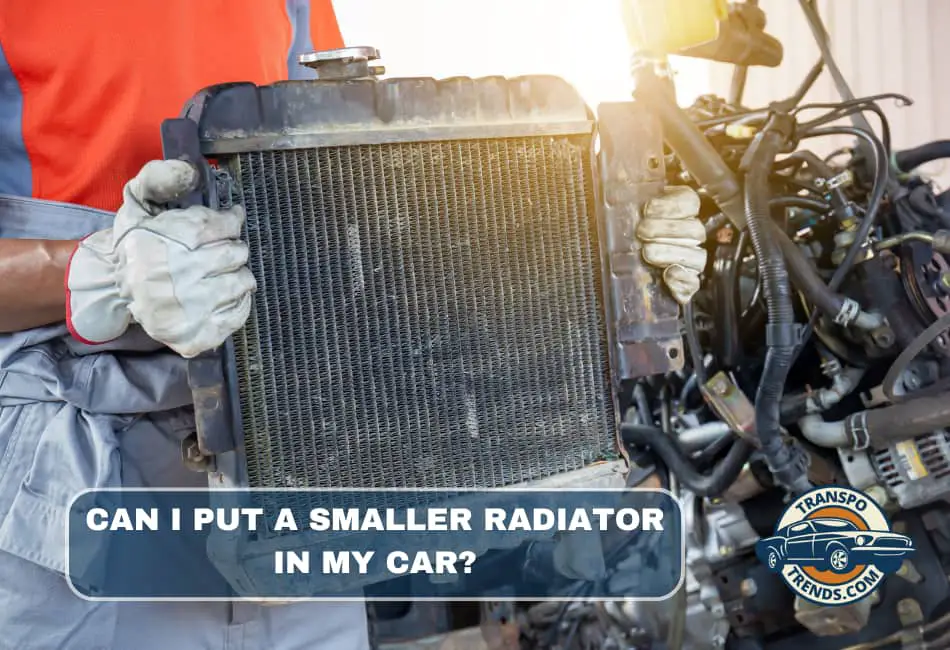A radiator is a critical component of your car’s cooling system. Its primary function is to keep the engine cool, preventing overheating and subsequent damage to the vehicle’s engine.
It achieves this by circulating coolant through the car’s system, absorbing heat from the engine, and dissipating it into the air. One might wonder, ‘Could I replace my current radiator with a smaller one?’
The answer to this is not straightforward, as various factors need to be considered. Issues such as the vehicle’s design, engine size, and the environment in which the car is often used can all influence this decision.
This article will delve further into this subject, outlining the implications of using a smaller radiator in your car.
The Modification Process
From my experience, removing the old radiator is the first and crucial step in the modification process. Safety is paramount: ensure your engine is cool before starting the process.
I once made the mistake of starting too soon after a drive, and let’s say it was a painful lesson learned. Unscrewing the radiator cap while the engine is hot can lead to hot coolant spraying.
Once the engine has cooled, drain the coolant, disconnect the hoses, and remove the radiator.
Ensuring Compatibility with the Original Housing
After successfully removing the old radiator, the next challenge I faced was ensuring the new, smaller radiator was compatible with the original housing.
This task can be surprisingly complex. In my case, I had to take accurate measurements of the original housing and ensure the new radiator fit perfectly.
A radiator that fails to fit can result in coolant leakages and, subsequently, overheating.
Well-fitted Radiator in the Overall Efficiency of the Cooling System
This brings me to my final point: the importance of a well-fitted radiator in the overall efficiency of the cooling system.
A lesson I learned from a friend’s experience is that the fit of your radiator is not something to compromise. He once installed a smaller radiator that didn’t fit snugly, thinking it would suffice.
Unfortunately, his car overheated on a summer road trip. The ill-fitting radiator failed to circulate the coolant efficiently, leading to this unfortunate event.
Therefore, a well-fitted radiator is not just about preventing leakages, it directly influences the performance and longevity of your engine.
Heat Dissipation Effect of Smaller Size Radiator
When I started tinkering with my car’s cooling system, I didn’t fully understand the relationship between radiator size and heat dissipation.
I quickly learned that a smaller radiator, while more compact, often has less surface area for cooling, leading to less efficiency.
I’ve found that while a smaller radiator may be less efficient at dissipating heat due to its size, modern designs and materials can help offset this disadvantage.
However, it’s a delicate balance. It’s critical to weigh the desire for a more compact radiator against the necessity for effective heat exchange.
Is it Worth It?
After my experiences with different radiators, I’ve been asked by many fellow car enthusiasts: is replacing your radiator worth it? There’s no straightforward answer.
Instead, it often comes down to a cost-benefit analysis. I once replaced a faulty radiator in a relatively old car, only to find that other heating system parts also needed replacement.
The costs quickly increased, making me wish I had just replaced the entire system.
It’s also important to assess the condition of the entire heating system. A radiator is only one piece of the puzzle, and replacing it won’t necessarily solve all your heating issues if other components are in poor shape. In my case, I learned this lesson the hard way.
Ultimately, the cost-effectiveness of replacing individual components versus the entire system varies.
For me, it’s been a process of trial and error, with each experience teaching me more about balancing performance, size, and cost when dealing with car radiators.
Replacement Options
When considering radiator replacements, there are a few key factors to consider.
Identifying Potential Replacement Options for Radiators
Aluminum radiators, for instance, are a popular choice due to their excellent heat dissipation capabilities.
However, copper-brass radiators, while heavier, are durable and proven. Thus, analyzing your specific needs is crucial before diving into the sea of choices.
Considering the Efficiency of Different Radiator Designs
Design is another factor that contributes to the efficiency of a radiator.
Once, I opted for a sleek, low-profile radiator for aesthetic reasons, only to realize its cooling capabilities weren’t up to par for my high-performance engine. I learned then that design and efficiency often go hand in hand.
Future Compatibility with Boilers and Circulation Equipment
Compatibility was a lesson I learned when I upgraded my entire heating system. The new high-end radiator I initially chose was not compatible with my existing boiler and circulation equipment.
This realization added unforeseen costs and taught me always to consider future compatibility.
Efficiency of Radiators vs. Boiler
During my adventures in car maintenance, I’ve discovered the boiler plays a central role in the heating system’s efficiency.
Even with an efficient radiator, the system will fall short if the boiler is not operating effectively. It’s a symbiotic relationship that can’t be overlooked.
Impact of Radiator Efficiency Versus Boiler Efficiency
After replacing my radiator and seeing minimal improvements, I upgraded my boiler. The impact was immediate and significant.
I realized that while the radiator disperses heat, the boiler generates it. A more efficient boiler can make a world of difference.
Cost Savings Associated with a High-efficiency Boiler
Investing in a high-efficiency boiler might seem costly upfront, but I’ve experienced the long-term cost savings firsthand.
With a more efficient system, my fuel costs decreased, and the performance of my heating system improved. It’s a worthy investment that pays off over time.
Common Reasons for Radiator Replacement
Leakage Issues and The Role of Plastic Tanks in Modern Radiators:
One of the most common reasons I needed to replace radiators was leakage issues. It turns out many modern radiators are equipped with plastic tanks.
While it may seem odd, these tanks are designed to be lightweight and cost-effective. Unfortunately, plastic is often prone to cracks and leaks, especially under extreme temperature fluctuations.
I remember one winter when I discovered a pool of coolant under my car – a surefire sign of a leaky radiator.
Damage Caused by Accidents or Road Debris:
I speak from experience when I say that road debris and minor accidents can wreak havoc on your radiator.
A stray rock or a minor fender bender can cause enough damage to warrant a complete radiator replacement.
One encounter with a rogue pothole was all it took to damage my radiator – a costly reminder to always be attentive on the road.
Practicality of Replacing Radiators Based on Specific Issues:
Sometimes, replacing a radiator is more practical than fixing the specific issues at hand.
For instance, when I discovered my radiator was severely corroded, I realized that attempting to repair such extensive damage was not cost-effective or guaranteed to work.
Sometimes, replacement is the most practical option.
Complex Failure Modes of Radiators
Exploring the Simplicity of Radiator Design:
Despite their critical role, radiators have a surprisingly simple design. They are essentially heat exchangers designed to cool your engine.
However, this simplicity does not exempt them from failure. It may make them even more susceptible to certain types of damage.
Common Failure Modes and Their Impact on Overheating:
The most common failure modes for radiators include leakage, blockages, and physical damage. These issues can lead to overheating, which can cause severe engine damage.
I once had a blocked radiator that caused my engine to overheat during a long drive. Let me tell you, an overheated engine in the middle of nowhere is not a fun situation!
Practical Solutions for Severe Radiator Problems:
Unfortunately, severe radiator problems often have limited practical solutions. Repairing a radiator can be complex and time-consuming; sometimes, it may be impossible.
When that aforementioned pothole damaged my radiator, no amount of repair could salvage it. It was a hard pill to swallow, but sometimes replacement is the only viable option.
Conclusion
Deciding whether to replace a radiator is not a decision to be taken lightly. One must consider the severity of the radiator’s damage, the cost of repair versus replacement, and the potential risk of engine damage due to radiator failure.
I always say it’s like playing chess – you must think several moves ahead to ensure you make the most beneficial decision.
Just like I wouldn’t buy a car without checking its history, I would never decide on radiator replacement without conducting proper research.
It is essential to understand the different types of radiator damage, their symptoms, and how they impact your vehicle’s performance.
Only then can you make a well-informed decision about whether radiator replacement is the best course of action.

